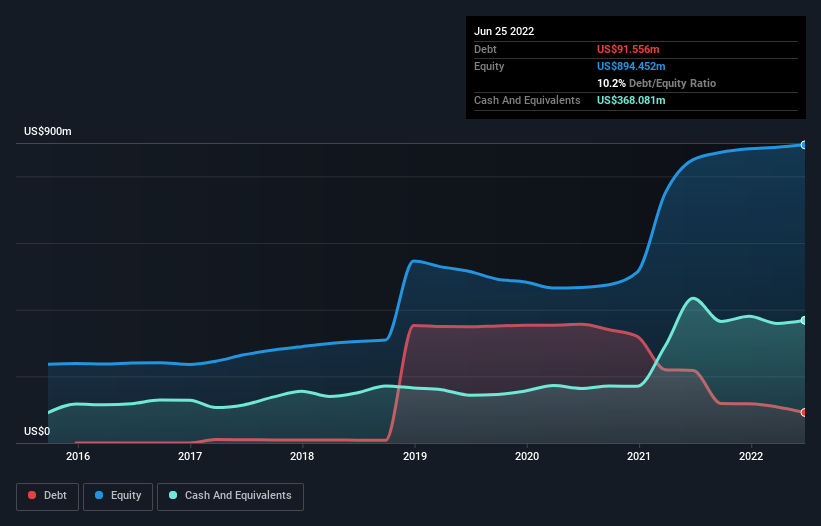
Legendary fund manager Li Lu (who Charlie Munger backed) once said, 'The biggest investment risk is not the volatility of prices, but whether you will suffer a permanent loss of capital.' So it might be obvious that you need to consider debt, when you think about how risky any given stock is, because too much debt can sink a company. We note that Cohu, Inc. (NASDAQ:COHU) does have debt on its balance sheet. But should shareholders be worried about its use of debt?
When Is Debt A Problem?
Generally speaking, debt only becomes a real problem when a company can't easily pay it off, either by raising capital or with its own cash flow. Part and parcel of capitalism is the process of 'creative destruction' where failed businesses are mercilessly liquidated by their bankers. However, a more frequent (but still costly) occurrence is where a company must issue shares at bargain-basement prices, permanently diluting shareholders, just to shore up its balance sheet. Of course, debt can be an important tool in businesses, particularly capital heavy businesses. When we think about a company's use of debt, we first look at cash and debt together.
View our latest analysis for Cohu
What Is Cohu's Debt?
The image below, which you can click on for greater detail, shows that Cohu had debt of US$91.6m at the end of June 2022, a reduction from US$217.4m over a year. But it also has US$368.1m in cash to offset that, meaning it has US$276.5m net cash.

A Look At Cohu's Liabilities
The latest balance sheet data shows that Cohu had liabilities of US$194.3m due within a year, and liabilities of US$150.7m falling due after that. Offsetting this, it had US$368.1m in cash and US$212.9m in receivables that were due within 12 months. So it can boast US$236.0m more liquid assets than total liabilities.
This excess liquidity suggests that Cohu is taking a careful approach to debt. Because it has plenty of assets, it is unlikely to have trouble with its lenders. Succinctly put, Cohu boasts net cash, so it's fair to say it does not have a heavy debt load!
And we also note warmly that Cohu grew its EBIT by 15% last year, making its debt load easier to handle. There's no doubt that we learn most about debt from the balance sheet. But it is future earnings, more than anything, that will determine Cohu's ability to maintain a healthy balance sheet going forward. So if you're focused on the future you can check out this free report showing analyst profit forecasts.
Finally, a business needs free cash flow to pay off debt; accounting profits just don't cut it. While Cohu has net cash on its balance sheet, it's still worth taking a look at its ability to convert earnings before interest and tax (EBIT) to free cash flow, to help us understand how quickly it is building (or eroding) that cash balance. Over the most recent two years, Cohu recorded free cash flow worth 67% of its EBIT, which is around normal, given free cash flow excludes interest and tax. This cold hard cash means it can reduce its debt when it wants to.
Summing Up
While it is always sensible to investigate a company's debt, in this case Cohu has US$276.5m in net cash and a decent-looking balance sheet. And it impressed us with free cash flow of US$96m, being 67% of its EBIT. So is Cohu's debt a risk? It doesn't seem so to us. There's no doubt that we learn most about debt from the balance sheet. However, not all investment risk resides within the balance sheet - far from it. Case in point: We've spotted 2 warning signs for Cohu you should be aware of, and 1 of them doesn't sit too well with us.
When all is said and done, sometimes its easier to focus on companies that don't even need debt. Readers can access a list of growth stocks with zero net debt 100% free, right now.
New: AI Stock Screener & Alerts
Our new AI Stock Screener scans the market every day to uncover opportunities.
• Dividend Powerhouses (3%+ Yield)
• Undervalued Small Caps with Insider Buying
• High growth Tech and AI Companies
Or build your own from over 50 metrics.
Have feedback on this article? Concerned about the content? Get in touch with us directly. Alternatively, email editorial-team (at) simplywallst.com.
This article by Simply Wall St is general in nature. We provide commentary based on historical data and analyst forecasts only using an unbiased methodology and our articles are not intended to be financial advice. It does not constitute a recommendation to buy or sell any stock, and does not take account of your objectives, or your financial situation. We aim to bring you long-term focused analysis driven by fundamental data. Note that our analysis may not factor in the latest price-sensitive company announcements or qualitative material. Simply Wall St has no position in any stocks mentioned.
About NasdaqGS:COHU
Cohu
Through its subsidiaries, provides semiconductor test equipment and services in China, the United States, Taiwan, Malaysia, the Philippines, and internationally.
Excellent balance sheet and slightly overvalued.
Similar Companies
Market Insights
Community Narratives



